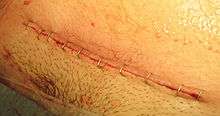Pfannenstiel incision

A Pfannenstiel incision /ˈfɑːnᵻnʃtiːl/ is a type of abdominal surgical incision that allows access to the abdomen. It is used for gynecologic and orthopedics surgeries,[1] and it is the most common method for performing Caesarian sections today. This incision is also used in Stoppa approach for orthopedics surgeries to treat pelvic fractures.[2] The Pfannenstiel incision offers large view of central pelvis but limits exposure to the lateral pelvis and upper abdomen, factors that limit the usefulness of this incision for gynecologic cancer surgery.[3] The surgeon cuts on a generally horizontal (slightly curved) line just above the pubic symphysis. This incision is commonly called the "bikini line incision". Some common reasons for this surgical access are obstetric delivery and hernia repair. It is often used in preference to other incision types for the sake of aesthetics, because the scar will be hidden by the pubic hair. This is of great advantage for women who like to expose their lower abdomen. The incision does not distort the belly button and heals faster than the traditional vertical incision.
Etymology
Although Pfannenstiel means "panhandle" in German, the name of the Pfannenstiel incision does not derive from the incision's shape or location. It derives instead from the surname of a German gynecologist, Hermann Johannes Pfannenstiel (1862–1909).[4]
See also
- Laparotomy
- Suprapubic incision
References
- ↑ Hoffman, Barbara; Schorge, John; Schaffer, Joseph; Halvorson, Lisa; Bradshaw, Karen; Cunningham, F. (2012-04-12). Williams Gynecology, Second Edition. McGraw Hill Professional. ISBN 9780071716727.
- ↑ Wade R. Smith; Bruce H. Ziran; Steven J Morgan (12 June 2007). Fractures of the Pelvis and Acetabulum. CRC Press. pp. 180–. ISBN 978-1-4200-1638-3.
- ↑ Higgins RV, Hall J, Naumann RW, Gaupp FB, Talavera F, Barnes AD (February 7, 2014). "Abdominal Incisions and Sutures in Gynecologic Oncological Surgery". medscape.com. WebMD LLC. Retrieved 17 February 2014.
- ↑ Elsevier (2003). Dorland's Illustrated Medical Dictionary (30th ed.). Philadelphia: Elsevier. ISBN 978-0-7216-0146-5.